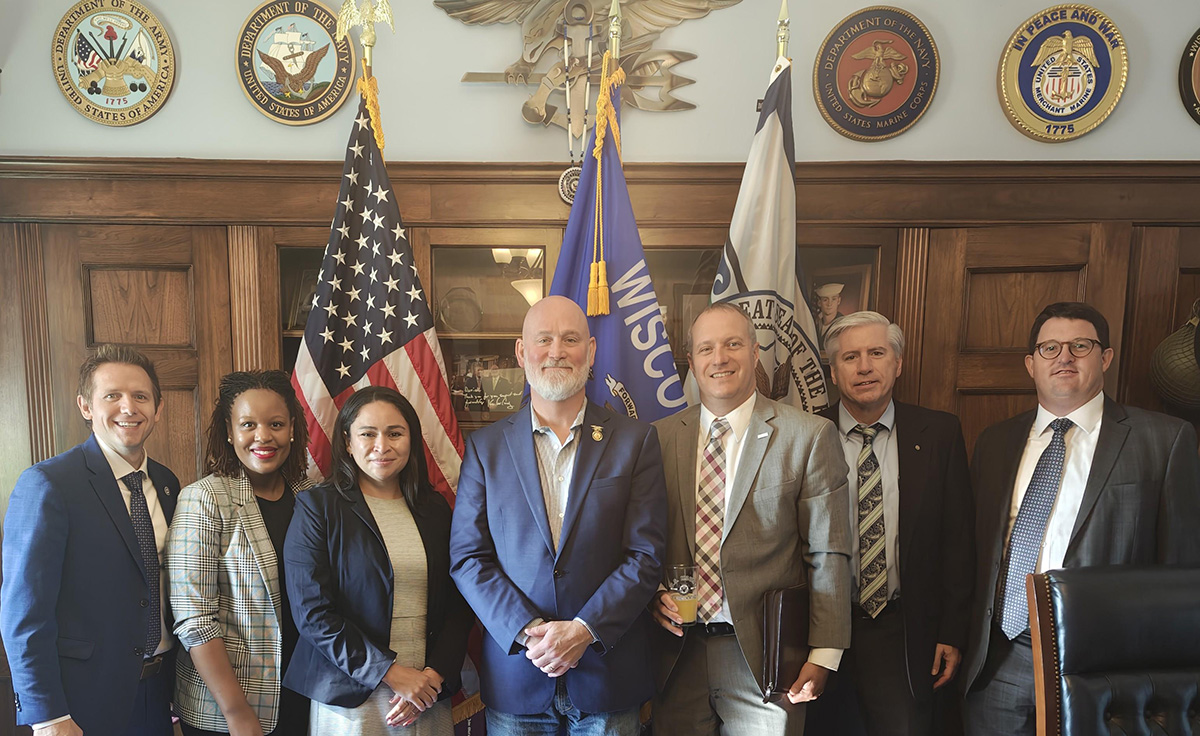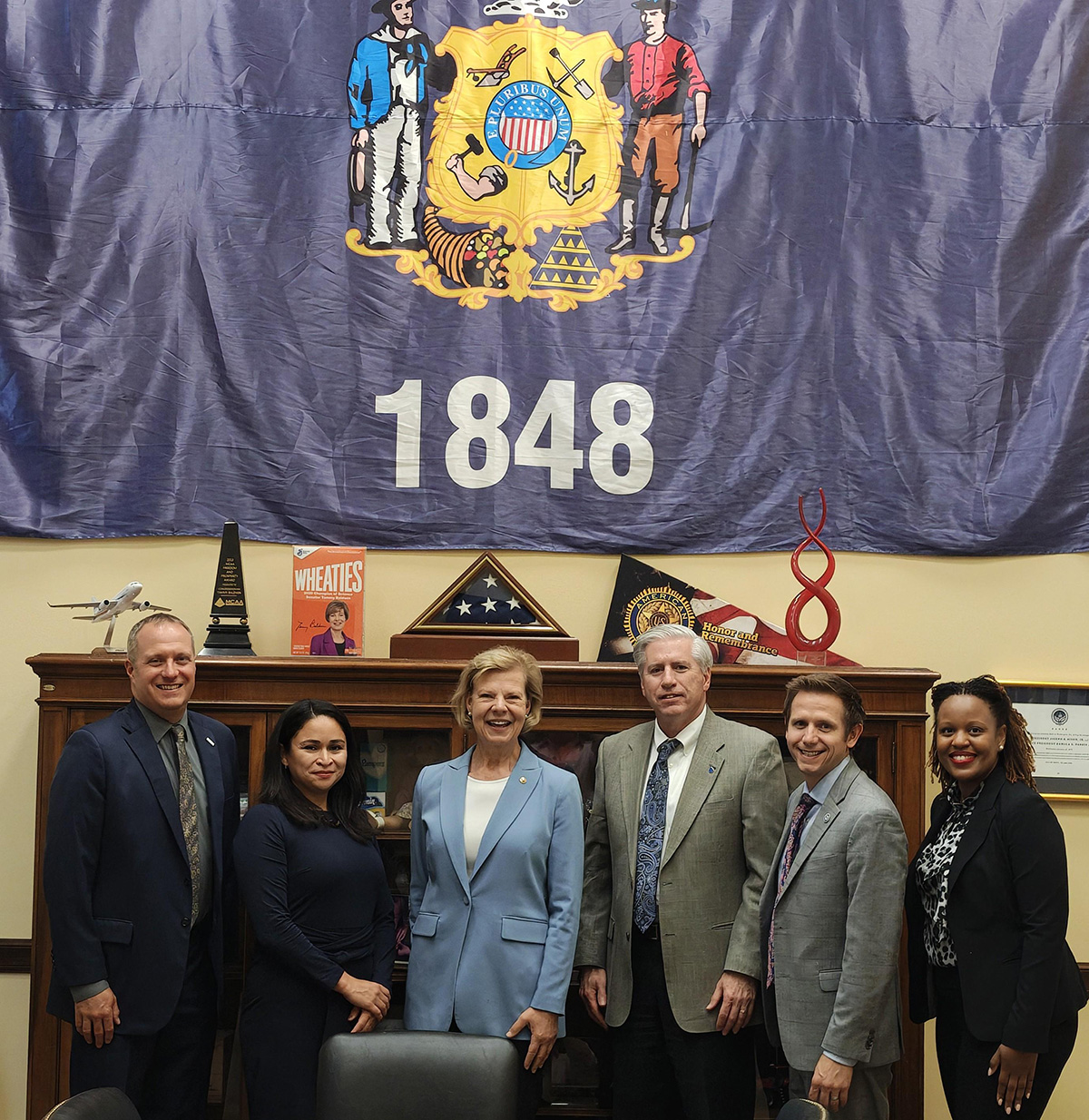Click here to view past issues
IN THIS ISSUE
- WHA in Washington, DC to Push for Health Care Extenders and Solution for Expiring Enhanced Health Insurance Premium Tax Credits
- WHA Expresses Concerns with Proposed 340B Rebates Outlined in HRSA Pilot
- Matching Grants Support Shovel-Ready Building Projects Including Clinics and Health Centers
- Wisconsin Hospitals State PAC & Conduit Surpasses $200,000, 137 Individual Contributors
- Understanding Values, Navigating Ethical Issues, and AI Imperatives in Health Care – Register Today
- Register Today For Hospital Board Education: Keeping Your Board Apprised and Legally Compliant
EDUCATION EVENTS
Mar. 4, 2026
Spring 2026 Annual Survey TrainingMar. 5, 2026
Operational Vacancy: An Effective Tool for Workforce PlanningMar. 12, 2026
Spring 2026 Annual Survey TrainingClick here to view education event calendar
View more issues of The Valued Voice
Sign Up for WHA's Newsletter
WHA in Washington, DC to Push for Health Care Extenders and Solution for Expiring Enhanced Health Insurance Premium Tax Credits
WHA was on Capitol Hill in Washington, DC Sept. 3-4 to meet with members of Wisconsin's Congressional Delegation. Among the topics discussed were the need for a continuing resolution with health care extenders being passed by Sept. 30, a recap on where Wisconsin stands after the passage of the One Big Beautiful Bill Act and the impact of enhanced health insurance premium subsidies expiring at the end of 2025. Joining WHA's group were Jim Nelson, Fort HealthCare SVP/CFO; Jeremy Levin, Rural Wisconsin Health Cooperative Director of Advocacy; Carina Marquez-Oberhoffner, Emplify Health Senior Consultant; Meagan Thompson, Aurora Health Care Director of Federal Affairs; and Brad Wolters, Marshfield Clinic Health System Director of Federal Government Relations.
 WHA and hospital leaders with U.S. Rep. Derrick Van Orden (center)
WHA and hospital leaders with U.S. Rep. Derrick Van Orden (center)
WHA's group of hospital leaders discussed the importance of Congress passing a continuing resolution (CR) that includes what has become known as the health care extenders package. This funding proposes extending telehealth, the hospital at home program and the Medicaid Dependent and Low Volume Adjustment (MDH/LVA) hospital programs. WHA emphasized the importance of telehealth and the hospital at home program in helping hospitals maximize their workforce to extend care to patients. Likewise, around 16 rural Wisconsin hospitals would lose an estimated $230 million over 10 years if the MDH/LVA programs ended. Most members of Wisconsin's Congressional Delegation expressed their support for these programs and their hope that Congress would pass an extension to the CR prior to the current one expiring, while also acknowledging that a government shutdown was possible due to current political disagreements.
 WHA and hospital leaders with U.S. Sen. Tammy Baldwin
WHA and hospital leaders with U.S. Sen. Tammy Baldwin
The group also discussed where Wisconsin currently stands in light of the changes in the One Big Beautiful Bill Act. WHA continues to monitor provisions included in the bill such as the Medicaid work requirements that are slated to begin in 2028. Wisconsin could be in a better position than most states if it is allowed to utilize its current Foodshare Employment and Training program work requirements that already apply to able-bodied adults without dependents on Foodshare, many of whom are likely currently receiving or eligible to receive Medicaid. WHA is also following various eligibility changes to Medicaid and Affordable Care Act (ACA) subsidies but is awaiting further estimates from WI Department of Health Services (DHS) and guidance from the Department of Health & Human Services (HHS) before being able to estimate what the impact may be on hospitals' uncompensated care.
 WHA and hospital leaders with U.S. Rep. Tom Tiffany (center)
WHA and hospital leaders with U.S. Rep. Tom Tiffany (center)
WHA's hospital leaders also expressed their thanks for the funding included in the Rural Health Transformation Program, which is expected to bring an additional $100 million or more annually to Wisconsin for improving rural health care from 2026-2030. The Centers for Medicare & Medicaid Services (CMS) is expected to release additional information on the program soon, but the funding is intended for rural hospitals to help with things such as preserving at-risk care like OB/maternity care, behavioral health care, workforce retention or technology needs.
Lastly, WHA's group of hospital leaders expressed concerns about the impacts on patients and hospitals if the enhanced premium tax credits that originated in the American Rescue Plan Act in 2021 were allowed to expire at the end of 2025. These enhanced subsidies have allowed people at 100-150% of the federal poverty level (FPL) to access plans with $0 premiums and low deductibles and other cost sharing. They also newly allowed those with incomes above 400% FPL to access subsidies, capping their premiums at 8.5% of income. According to the Kaiser Family Foundation, a 60-year-old couple making a combined income of $82,000 could see their health insurance premiums under a benchmark silver plan by anywhere from $16,000 to nearly $23,000 annually if the enhanced subsidies are not extended. WHA received positive feedback from a number of Wisconsin's Congressional members and staff regarding their concern for the impacts if Congress does not extend these subsidies or find an alternative solution.
WHA will continue to closely follow and advocate for these priorities. Contact WHA Vice President of Federal and State Relations Jon Hoelter with questions.
WHA in Washington, DC to Push for Health Care Extenders and Solution for Expiring Enhanced Health Insurance Premium Tax Credits
WHA was on Capitol Hill in Washington, DC Sept. 3-4 to meet with members of Wisconsin's Congressional Delegation. Among the topics discussed were the need for a continuing resolution with health care extenders being passed by Sept. 30, a recap on where Wisconsin stands after the passage of the One Big Beautiful Bill Act and the impact of enhanced health insurance premium subsidies expiring at the end of 2025. Joining WHA's group were Jim Nelson, Fort HealthCare SVP/CFO; Jeremy Levin, Rural Wisconsin Health Cooperative Director of Advocacy; Carina Marquez-Oberhoffner, Emplify Health Senior Consultant; Meagan Thompson, Aurora Health Care Director of Federal Affairs; and Brad Wolters, Marshfield Clinic Health System Director of Federal Government Relations.
 WHA and hospital leaders with U.S. Rep. Derrick Van Orden (center)
WHA and hospital leaders with U.S. Rep. Derrick Van Orden (center)
WHA's group of hospital leaders discussed the importance of Congress passing a continuing resolution (CR) that includes what has become known as the health care extenders package. This funding proposes extending telehealth, the hospital at home program and the Medicaid Dependent and Low Volume Adjustment (MDH/LVA) hospital programs. WHA emphasized the importance of telehealth and the hospital at home program in helping hospitals maximize their workforce to extend care to patients. Likewise, around 16 rural Wisconsin hospitals would lose an estimated $230 million over 10 years if the MDH/LVA programs ended. Most members of Wisconsin's Congressional Delegation expressed their support for these programs and their hope that Congress would pass an extension to the CR prior to the current one expiring, while also acknowledging that a government shutdown was possible due to current political disagreements.
 WHA and hospital leaders with U.S. Sen. Tammy Baldwin
WHA and hospital leaders with U.S. Sen. Tammy Baldwin
The group also discussed where Wisconsin currently stands in light of the changes in the One Big Beautiful Bill Act. WHA continues to monitor provisions included in the bill such as the Medicaid work requirements that are slated to begin in 2028. Wisconsin could be in a better position than most states if it is allowed to utilize its current Foodshare Employment and Training program work requirements that already apply to able-bodied adults without dependents on Foodshare, many of whom are likely currently receiving or eligible to receive Medicaid. WHA is also following various eligibility changes to Medicaid and Affordable Care Act (ACA) subsidies but is awaiting further estimates from WI Department of Health Services (DHS) and guidance from the Department of Health & Human Services (HHS) before being able to estimate what the impact may be on hospitals' uncompensated care.
 WHA and hospital leaders with U.S. Rep. Tom Tiffany (center)
WHA and hospital leaders with U.S. Rep. Tom Tiffany (center)
WHA's hospital leaders also expressed their thanks for the funding included in the Rural Health Transformation Program, which is expected to bring an additional $100 million or more annually to Wisconsin for improving rural health care from 2026-2030. The Centers for Medicare & Medicaid Services (CMS) is expected to release additional information on the program soon, but the funding is intended for rural hospitals to help with things such as preserving at-risk care like OB/maternity care, behavioral health care, workforce retention or technology needs.
Lastly, WHA's group of hospital leaders expressed concerns about the impacts on patients and hospitals if the enhanced premium tax credits that originated in the American Rescue Plan Act in 2021 were allowed to expire at the end of 2025. These enhanced subsidies have allowed people at 100-150% of the federal poverty level (FPL) to access plans with $0 premiums and low deductibles and other cost sharing. They also newly allowed those with incomes above 400% FPL to access subsidies, capping their premiums at 8.5% of income. According to the Kaiser Family Foundation, a 60-year-old couple making a combined income of $82,000 could see their health insurance premiums under a benchmark silver plan by anywhere from $16,000 to nearly $23,000 annually if the enhanced subsidies are not extended. WHA received positive feedback from a number of Wisconsin's Congressional members and staff regarding their concern for the impacts if Congress does not extend these subsidies or find an alternative solution.
WHA will continue to closely follow and advocate for these priorities. Contact WHA Vice President of Federal and State Relations Jon Hoelter with questions.
IN THIS ISSUE
- WHA in Washington, DC to Push for Health Care Extenders and Solution for Expiring Enhanced Health Insurance Premium Tax Credits
- WHA Expresses Concerns with Proposed 340B Rebates Outlined in HRSA Pilot
- Matching Grants Support Shovel-Ready Building Projects Including Clinics and Health Centers
- Wisconsin Hospitals State PAC & Conduit Surpasses $200,000, 137 Individual Contributors
- Understanding Values, Navigating Ethical Issues, and AI Imperatives in Health Care – Register Today
- Register Today For Hospital Board Education: Keeping Your Board Apprised and Legally Compliant

